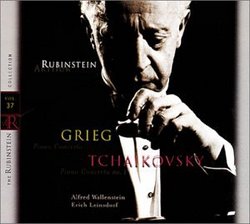| All Artists: Edvard Grieg, Pyotr Il'yich Tchaikovsky, Alfred Wallenstein, Erich Leinsdorf, Boston Symphony Orchestra [members of], RCA Victor Orchestra, RCA Victor Symphony Orchestra, Artur Rubinstein Title: Rubinstein Collection, Vol.37 (Grieg: Piano Concerto in A Minor / Tchaikovsky: Piano Concerto No. 1) Members Wishing: 1 Total Copies: 0 Label: RCA Original Release Date: 1/1/1956 Re-Release Date: 8/7/2001 Album Type: Box set, Original recording remastered Genre: Classical Styles: Forms & Genres, Concertos, Historical Periods, Modern, 20th, & 21st Century, Instruments, Keyboard, Symphonies Number of Discs: 1 SwapaCD Credits: 1 UPC: 090266303724 |
Search - Edvard Grieg, Pyotr Il'yich Tchaikovsky, Alfred Wallenstein :: Rubinstein Collection, Vol.37 (Grieg: Piano Concerto in A Minor / Tchaikovsky: Piano Concerto No. 1)
CD Details |
CD ReviewsDry Grieg and Relaxed Tchaikovsky Hank Drake | Cleveland, OH United States | 11/08/2001 (4 out of 5 stars) "Rubinstein unashamedly loved the Grieg Concerto, dismissing many pianists' claims that it was "cheap stuff." When stereo recording became available, he was eager to record it with Fritz Reiner and the Chicago Symphony. However, a fallout with the irascible conductor put a stop to those plans. In February of 1956, Rubinstein set up shop with Alfred Wallenstein and the RCA Victor Symphony Orchestra--a pick-up group used for recordings. There are several problems with this recording which prevent it from being of the first-rank. Rubinstein seems rushed here. His phrasing seems clipped, without the relaxed, natural sounding quality we usually associate with this pianist. The orchestral accompaniment leaves much to be desired also. Although they play reasonably together and in-tune, there are numerous balance and intonation problems. The sound, like many of RCA's early Living Stereo recordings, is extremely dry, even with remastering. On the whole, this is not a memorable performance, and Rubinstein's 1961 remake (Volume 60) is a vast improvement.This was the last of Rubinstein's three recordings of Tchaikovsky's warhorse, and is the product of fifty years of experience playing and thinking about the piece. This performance is the antithesis of his first recording with Barbirolli (Volume 1 of the Rubinstein Collection). The earlier version, though undeniably exciting, was played rather sloppily and suffered from poor sound. These problems were a factor in RCA's decision to supersede the Rubinstein/Barbirolli version with the Horowitz/Toscanini recording made in 1941. Rubinstein was furious at RCA's move, and roundly criticized the latter performance as being artistically deficient and technically defective. (He was right on the second count: Side 6 of the 8 sided 78-RPM set was markedly off pitch with the rest of the concerto.) For the liner notes of this recording of the Tchaikovsky, Rubinstein remarked about his change in approach, claiming that he wanted to "reestablish what a beautiful, beautiful piece it is." He also criticized the way certain pianists performed the piece as a virtuoso warhorse, and those who knew Rubinstein's history with his rival knew that his verbal barbs were aimed squarely at Horowitz.Rubinstein's 1963 performance is one of the more lyrical interpretations of Tchaikovsky's well-worn warhorse. The pianist certainly lets virtuoso fireworks burst from the keyboard when the music calls for it. But, phrasing, tempo, and dynamics bespeak of a kinder, gentler Tchaikovsky First. Erich Leinsdorf and the Boston Symphony Orchestra do a fine job of accompaniment. RCA's remastered sound is well balanced and smooth."
|


 Track Listings (6) - Disc #1
Track Listings (6) - Disc #1